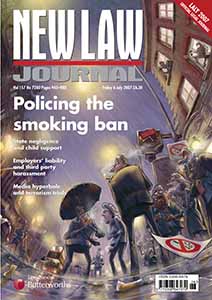
James Pirrie and Bradley Williams reflect on the Court of Appeal’s findings in Charman v Charman
In brief
The compensatory principle is paramount in assessing damages, says Betul Milliner
Should the tort of conversion apply to intangible property? Gregory Mitchell QC investigates
It’s time to stop the hyperbolic reporting of terrorist cases, says Tanveer Qureshi
Legal aid heroes take centre stage on Oscar night
In brief
How will the new non-smoking legislation affect the workplace? Jeremy Nixon investigates
Does the long-awaited corporate manslaughter legislation represent a lost opportunity? asks Bilal Rawat
MOVERS & SHAKERS

NLJ Career Profile: Ken Fowlie, Stowe Family Law
Ken Fowlie, chairman of Stowe Family Law, reflects on more than 30 years in legal services after ‘falling into law’

Gardner Leader—Michelle Morgan & Catherine Morris
Regional law firm expands employment team with partner and senior associate hires

Freeths—Carly Harwood & Tom Newton
Nottinghamtrusts, estates and tax team welcomes two senior associates







